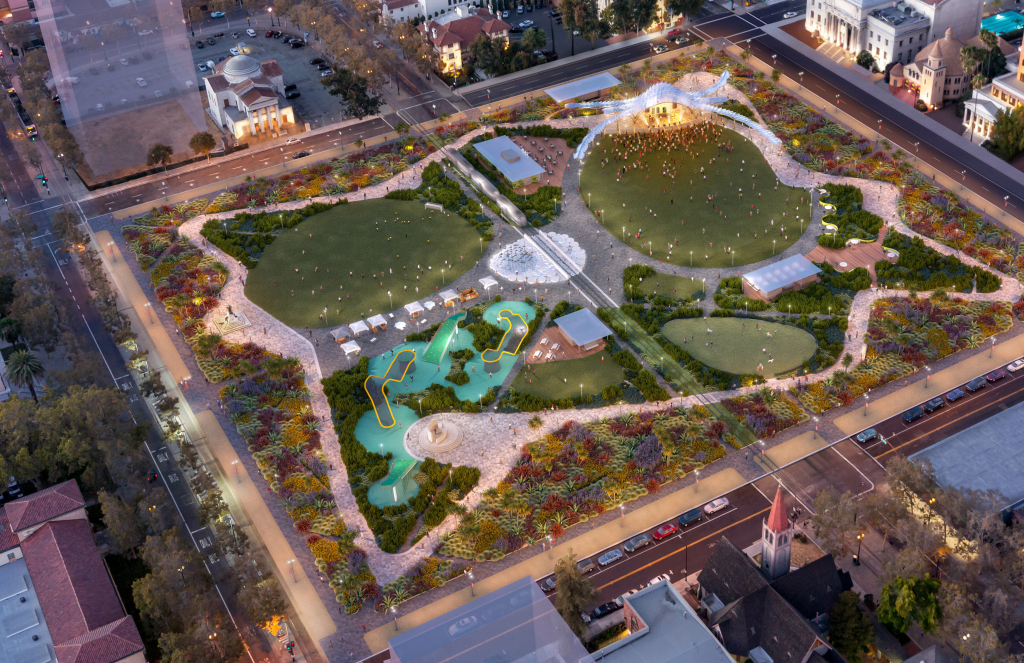A preservationist group is seeking a court order to reverse the approval of San Jose’s massive redesign of St. James Park and stop plans to build a performing arts pavilion that could attract thousands to the downtown park grounds.
The Sainte Claire Historic Preservation Foundation this week filed a lawsuit in the Santa Clara County Superior Court against San Jose alleging that it violated the city’s own historic preservation ordinance, as well as the state’s environmental review process when it approved a redesign plan for St. James Park in late October. The foundation also filed an appeal of the city’s authorization of a historic preservation permit for the project, which the San Jose City Council will discuss at its meeting on Tuesday.
The foundation focuses on the preservation of the 1893 St. Claire Club building, which sits on the northern edge of St. James Park and serves as home to the second-oldest men’s social club in the state. And, in its lawsuit, the group argues that the pavilion would alter the park to such an extent that it would jeopardize the historic landmark designations on its 127-year old building and that of the St. James Square National Register Historic District, which includes the park and eight other buildings in the surrounding area.
The foundation’s leaders say they support the city’s efforts to revitalize the shabby park but not the addition of a “problematic” performing arts and music pavilion.
“We simply ask the Court to enforce clear requirements of CEQA and the city’s own ordinances that protect the historical integrity of St. James Park and the historic district,” the foundation’s executive director Shawn Atkisson said in a statement. “The park project should proceed, and our legal action will not prevent it when revised to relocate the Levitt Pavilion to a compatible site without significant environmental impacts.”
St. James Park, which was constructed in the 1800s, was originally envisioned to serve as a flourishing haven and public square for residents of San Jose. But over the decades, the 7.5-acre park has deteriorated and became afflicted with crime, blight and homelessness.
The redesign vision of St. James park features a new playground, dog parks, a cafe and an outdoor pavilion that could accommodate 50 to 300 events annually like film festivals, concerts and dance and theater performances. The plans envision that the largest events at the park could accommodate up to 5,000 attendees.
An environmental impact report released earlier this summer found that the proposed plans would cause “significant and unavoidable” impacts on the historic character of the park as well as an increase in noise for the surrounding community members. To reduce the amount of noise caused by events at the pavilion, the report proposed ending all events at 10 p.m. and offered alternatives such as building an enclosed pavilion or placing the proposed pavilion in Discovery Meadow at the southern end of the Guadalupe River Park instead.
Despite the impacts related to noise and the historic character of the area, the city council approved the plans and opted against pursuing the proposed alternatives.
In the lawsuit, the foundation argues that the city violated its Historic Preservation Ordinance, which prohibits approval of a project that is “detrimental to a historic district or to a structure,” and that it failed to comply with state regulations when rejecting the alternative Discovery Meadow location for the pavilion without a legal basis.
San Jose City Attorney Nora Frimann on Friday said she had not yet seen the lawsuit but that the city “believes that the environmental review was proper.”
About five years ago, the Mortimer & Mimi Levitt Foundation — a national nonprofit organization that has helped transform dilapidated parks across the country — approached San Jose about interest in building one of its outdoor performing venues in San Jose to hold 50 free concerts for the community each year. Under the program, the foundation pledged to put $500,000 toward building a “Levitt Pavilion” in an urban park in need of revitalization and San Jose was required to assemble a nonprofit board to raise funds to pay for the live entertainment once the project was constructed.
Brian Grayson, a board member on the Friends of Levitt Pavilion-San Jose and a former executive director of the San Jose Preservation Action Council, said if the pavilion was moved to Discovery Meadow, years of planning and crusading by his group would all be for naught.
“(The foundation) looks for spaces that have fallen into disrepair or on hard times but that have potential,” Grayson said in an interview Friday. “If the city were to relocate (the pavilion) to Discovery Meadow, it most likely would not be a Levitt project, because that area wouldn’t fall into that sort of designation.”
Grayson said he’s holding out hope that the city and the Sainte Claire Historic Preservation Foundation can come out of this with something that appeases everyone, even if it requires litigation.
“Given the history here, it’s understandable that folks would have some concerns, but we hope that they can be resolved,” he said. “…Based on the information we have at this point, I think the historic resources can be protected and a project like the pavilion can still co-exist with that.”
Despite the foundation’s worries over the impacts of the park’s redesign, building a pavilion of the scope envisioned is still merely a grandiose dream. The city has only secured $7 million — or less than 15% — of the project’s whopping estimated price tag of $59.1 million and has yet to determine a funding source for the remaining costs.










